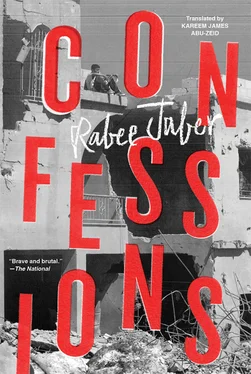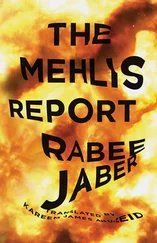maamoul cookies, and I remember the dates on the table, my big sister crushing pistachios — but more than anything else I remember the flour on my mother’s dress, the smell of lard and rose water, and the warmth of the place — the stove filled the room with heat. My mother was half-asleep when she looked at me, she almost seemed to be dozing off, as if she were making us
maamoul in her sleep, as if she’d been drugged, as if she were moving in a dream and mixing the pistachios with — was it lard or butter? — I don’t know…. The memory is distant, and sometimes I think it’s my oldest memory, not that other one, the one with my father burning things. I don’t know. Maybe it isn’t very important. (I often tried — and soon you’ll find out why this is so important — to determine the age of those first memories, arranging them systematically so that I could understand them, so that I could perhaps find my way back to the beginning…. But this is difficult, extremely difficult, and then there’s the fact that memories can be deceiving: I used to sometimes remember the peach tree in bloom behind the house, not far from the stove, but sometimes that same tree would be black and completely leafless in my memory, so dry that if a single flame from the fire my father had started touched it, the whole tree would’ve burned to ash in an instant. Memories can be deceiving, and in my case they deceived me twice. They deceived me twice, for I’m not myself.)
One more memory and then I’ll continue: My father was carrying me on his shoulders and plunging into a river. I held onto his head so I wouldn’t fall, and my big brother laughed as he helped my sisters across. My mother waited for us on the other side of the river, and she was laughing too. (My father had carried her across first. He carried her on his back, and I still haven’t forgotten how she laughed and how my sisters laughed as he plunged into the green water and disappeared for a moment under the shadows of the green trees before reappearing on the other side. I think it was the Abraham River, I think we were spending the day there. We often used to go up to the Mar Charbel Monastery and the Abraham River. We’d take a picnic basket and spend the whole day up there, not returning to Achrafieh until sunset.) I remember the river rising almost to my face before receding, while my father stepped between the stones and the water drenched his legs and pants, which he’d folded up above the knee, and I remember the smell, the smell of tobacco and his sweaty shirt — his smell. I remember one of my sisters was calling me, and I turned around to look at her, still riding on my father’s shoulders as he held onto my feet — his hands were huge, and he was laughing. I looked at my sister: I saw her standing by the car, a blue Peugeot (a Peugeot 504, which was new — at the time you only saw the old white Peugeot 404s on the streets of Beirut). I saw her standing by the car, the hood nestled between the broom shrubs and the thistle — my father had parked it like that to scare my mother, he had taken his time applying the brakes. The doors of the car were open, so was the trunk. My sister stood by herself, a radio in one hand and a bag in the other. The large red radio had a broken dial, and she had to move the tuning needle with her finger whenever she wanted to change the station. I remember the clear laughter and the running river — these sounds are still in my mind. The sunlight poured onto the river, and the beads of light glistened on the beads of water. I helped my brother gather wood while my father started a small fire, and my mother kept an eye on my sisters as they stabbed skewers through the meat.
I can’t doubt these memories: they’re part of who I am. All of this is me. But… Listen: during the war, in that first period from my memories, the world was unclear to me — maybe it wasn’t because of the war, but rather my age, how young I was: I was little, I was often scared. Yes, I remember that, I can always remember my fear.
My big brother was afraid too, but he feared for my mother. I learned to love him by watching him love my mother. He used to take care of her as if she were his own daughter. You wouldn’t believe how he took care of her, how he looked after her back then. Did he really take care of her as if she were his daughter? No, but he cared for her as if she were his mother and he were hers alone, as if he were her only son, as if he were all she had in this world. He used to berate all of us whenever he saw her tired or lost in sadness. If she wore herself out doing chores around the house, he’d yell at my sisters, even though all of them — with the exception of young Liliane — used to help her.
My father kept silent as he listened to my brother, who would calm down if he noticed my father could hear him — when my father was present, my brother seemed broken, defeated. He never pushed me in the presence of my father. He’s nine years older than me. Once he pushed me down the stairs: I stumbled, lost my balance, and hit my head against the wall. A drop of blood oozed from my temple. He was on the verge of tears as he picked me up and made me swear on my mother that I wouldn’t tell anyone. I promised I wouldn’t say a word, and I asked him why he’d pushed me. We’d been playing, and I had no idea what had happened. Something had changed in him for no apparent reason, as if he’d remembered something, as if something had suddenly crossed his mind — and in the blink of an eye, he’d turned on me.
In the beginning, things — all things — were incomprehensible. I remember my mother at church, during Mass, placing her warm, trembling hand on my head. She was crying, but I didn’t know why. My eyes were glued to the man standing at the altar, who was holding a large heavy censer from some chains, a censer the color of gold. He was swinging it in front of him, in front of his broad chest covered in fine dark robes…. The hymns mingled with the incense, filling the vast space of the church, while my mother’s hand — heavy, hot, trembling — remained on my head, as if she were probing my skull. Why was her hand shaking like that? It felt like a small animal was weeping on top of my head. What was wrong with her? People were turning around, showing me their faces (neighbors I knew, women I’d seen, whose names I’d learned from my sisters, and also some women I didn’t know, women who weren’t from this neighborhood — I saw a lot of strange faces at Mass). Perhaps they were staring at me, but I wasn’t sure — they could’ve been staring at my mother, or maybe their eyes were fixed on my clean and ironed clothes, I don’t know. They never wore those unfathomable masks while looking at my sisters, and when my big brother used to come to church with us I never saw their faces change like that when they looked at him . Was I imagining things? I went back home feeling weak. It was as if something had left me, as if the strength had left my body under those gazes. I was young — I didn’t think like that back then, but now, when I remember the young boy I was, that’s how I remember him. Now I know him better than he used to know himself.
I remember him in the living room, by himself, raising his eyes to the picture hanging on the wall. He looked at his little brother and saw the reflection on the glass. The photo was enlarged, in a black wooden frame, with a black ribbon hanging in the upper corner. He didn’t climb onto the sofa, didn’t lift his hand, didn’t touch the frame of the picture. His little sister often touched the frame of the picture, but he didn’t know why. Was she touching the frame, or trying to touch the smiling face beneath the glass? His older sister would wipe the glass with a wet cloth. She’d wipe it slowly, and I often saw tears in her eyes as she did so. I can only ever remember her wiping it with tears in her eyes, even though that’s not logical, even though I know it’s not true — I know she wiped the dust off her little brother’s picture countless times without tearing up. One changes with the passing of time, life becomes routine, and as she wiped the glass she no longer thought about what she was doing and continued cleaning, wiping dust from the sofa’s wooden headrest and from the small table where her father kept his stone ashtray.
Читать дальше












